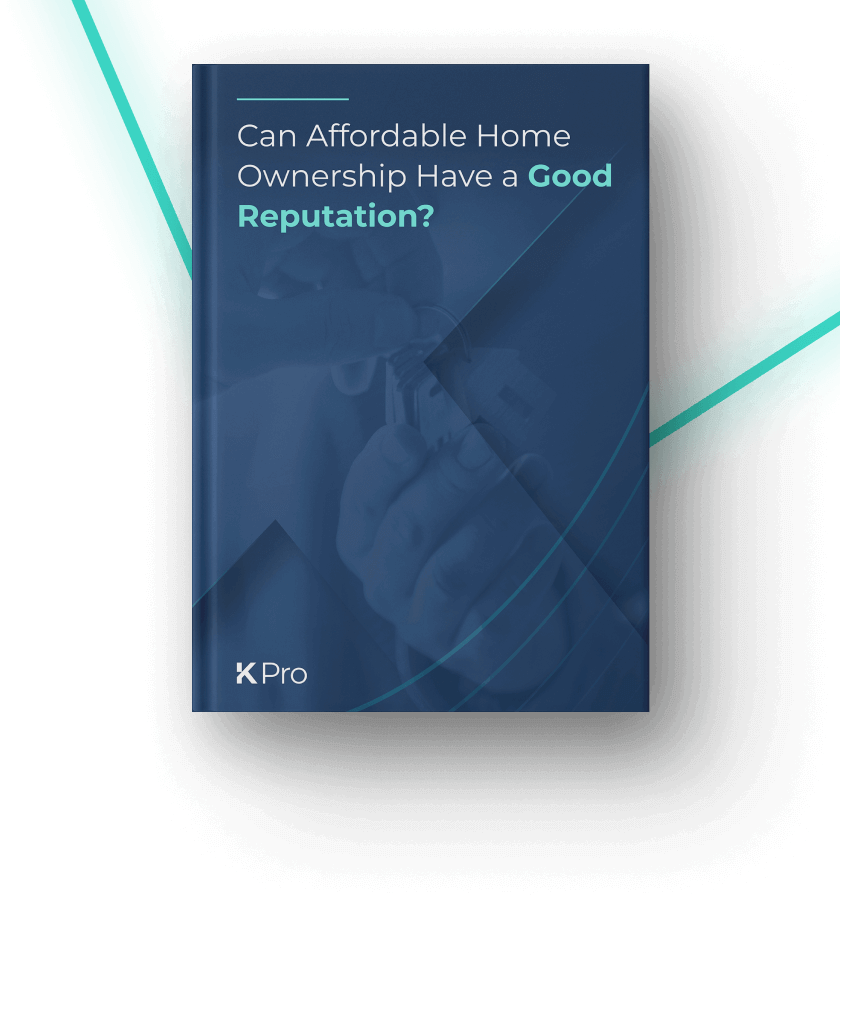
How Can Affordable Housing Providers Use Fewer Tools?
It’s no secret that housing associations use lots of marketing, sales and letting software. Tech stacks quickly pile up as poorly integrated solutions are added to workflows. Costs in time and money run away with themselves and internal operations become overburdened and inefficient.
Although too many tools will balloon your budget, the big problem here is integration and synchronisation. If you have systems that aren’t talking to each other, it will damage your visibility over data and dislocate workflows — all of which can have a catastrophic impact on outcomes. The more tools you use, the harder this is to manage.
Observing these challenges first-hand is why we built KPro — a flexible solution, that can integrate an existing system, or provide an end-to-end solution from the ground up. But that’s jumping the gun a bit when it comes to identifying the solution. Let’s start by looking at the problems you face in the first place.
Suggested reading: If you want to learn more about how technology is changing the future of affordable housing, check out our new eBook — Can Affordable Home Ownership Have a Good Reputation?

Challenges that lead to using too many tools
Let’s face it, our industry is a niche market, one that has severely limited options when it comes to supportive services. Salesforce and Microsoft Dynamics for example, are powerful and useful CRMs, but they are not necessarily the best CRMs for affordable housing providers and were not built for the complex specifics of affordable home ownership customer relationships. The rampant use of spreadsheets and paper suggests a lack of end-to-end solutions.
As well as manual processes, affordable housing providers rely on large tech stacks that slow down workflows. We found that 60% of affordable housing providers use at least 50 or more digital tools:
Active Tech Counts of Housing Associations:
- Wrekin Housing Trust uses 11 1
- Framework Housing Associations uses 38 2
- Swan Housing Association uses 50 3
- Eildon Housing Association uses 534
- Manningham Housing Association uses 555
More often than not, custom-built and lead management systems are combined with spreadsheets and CRMs, that aren’t optimised to the complexities of affordable home ownership.
Listing details
For example, how do we list properties that reflect all of the unique specifics of affordable home ownership? Interfaces on listing platforms like Zoopla or Rightmove, are all well and good for traditional markets. But they are quite limited when it comes to providing additional details. Listing tools (like Alto or Showcase IDX) on the other hand are often designed with commercial real estate in mind. A specialist tool is required that allows prospects to refine their circumstances e.g. ownership share, rent percentages and other complex ownership situations.
Lead management
The lack of support services means agents have to manage all of their leads through numerous, separate channels. Standard protocols for this type of data collection vary from one housing association and other affordable housing providers to the next. Poor and inefficient tools (like spreadsheets) are often used. As a result, more manual processes bog down the sales and letting process.
Leads are frustrated and sometimes lost altogether because inconsistent data formats are prone to errors. Even if they aren’t lost, leads often aren’t followed up quickly or in the most relevant way. Lead statuses and information should be centralised into a single solution that prevents cumbersome exchanges of poorly managed data.
Complex documentation
Our research into tech stacks revealed 40% of affordable housing providers use Google analytics. Clearly, analytics are important. So it comes as no surprise (believe us!) that many housing associations are desperate for a system that eases the process of CORE collection.
CORE logs are vital for marketing, letting and sales processes. After all, they inform every department of your team with invaluable information that can be used to spearhead day-to-day operations. Yet, many housing associations are bogged down with designing and manually extracting reports and the data they contain.
A centralised solution for generating reports – accessible to all – is crucial for aligning and unifying different departments and their internal processes.
Bookings by phone & remote working
Agents spend a lot of time visiting properties for multiple reasons. It’s often the case that agents out in the field and staff in the office are out of sync. Having instead to rely on more traditional means of communication. Whether that’s filling in a report on paper and updating colleagues via a phone call. Or simply entering data into computers once they’re back in the office.
Similarly, viewings booked over the phone add to the list of things agents must deal with. Small issues eventually tug away at the bigger picture. Customer journeys can be unnecessarily prolonged due to manual processes.
See how a digital toolkit could build you a better future.
The big issue is integration
All of these challenges lead to providers purchasing more poorly integrated specialist tools. Property software providers like Reapit and Jupix work well for other areas within the sector. However, they don’t cover niche-specific regulations, provide necessary segmentation tools, or address the complexities of our tenure types.
Moreover, a lack of solutions for full integration of multiple systems sits at the heart of the problem that many housing associations face. As a result, a patchwork of internal processes fail to meet customers’ requirements. This leads to a shift in focus away from the needs of tenants and homeowners, towards ideas focused around just “getting the job done”. It’s also why so many outdated and manual processes are required to fill in the gaps.
So, how do inefficient processes hurt affordable housing providers?
Development of manual processes
We’ve already touched on some examples of manual processes. For example, we see housing associations use spreadsheets time and time again. Often this means data and crucial customer information is collected, managed and stored in information silos.
Quick-fix solutions are always unsustainable in the long run. Eventually, they degrade the standard of service of affordable home providers and stagnate their growth.
Why?
Well, manual processes lead to:
- Uninformed decision-making: Lack of information access and transparency leads to poor strategic planning. Cross-tool performance between poorly integrated solutions disrupts information flow across departments. Manual processes added to the mix distort business objectives further; all the way down the communication chain. As a result, the maximum impact of limited resources is never realised.
- Restrictive channels of communication: All customers have their preferences. Some prefer to see agents face to face. Others might like to discuss an issue on the phone. These days, a lot of people prefer alternative online communications. Omni-channels are therefore crucial for the future of affordable home ownership.
- Delayed intervention of housing-related issues: CORE reports are essential for funding, setting out business objectives and anticipating industry-wide issues. However, manual processes are solutions with limited scope, focused mainly on individual cases and resolutions. Generally, any concept of the bigger picture is lost for housing associations who largely depend on manual processes. Teams without a centralised system to tailor industry specific reports cannot accurately analyse data.
- Reactive tenant support: The industry suffers from a poor reputation because many housing associations have adopted a reactive strategy. Solutions are needed to accommodate complex e-sign documents and streamline other verifications in sales and letting processes. Printing, posting and filing documents costs precious time. Therefore, a tool that encourages proactive tenant support, by delivering real-time, work on-the-go features, is essential for maximising efficiency and enhancing overall customer experiences.
- Lack of opportunity for reinvestment: Manual processes severely limit the capabilities of day-to-day operations. Research found that professionals spend around 31% of their time processing inefficient, paper-based systems.6 This eats away at precious time and money. A digital transformation, that allows teams to do more with less, frees up resources that can be used elsewhere.
KPro started as an in-house solution for industry-specific challenges, helping affordable housing providers list and manage leads on Keaze. We designed an end-to-end modular package with unparalleled integration capabilities. Allowing our customers the freedom to choose a completely brand new system or add KPro to existing internal processes. We intentionally designed it this way because…

Technology needs to be flexible to be useful
We understand that systems take time to build. Workforces grow accustomed to a particular way of doing things, but the future of housing associations demands more effective technology and new ways of thinking. KPro’s flexibility improves existing solutions in your internal processes. These are transformed through centralised and automated operations that:
- Refine your lead management
- Streamlines workflows
- Add automated solutions for internal admin processes and analysis reports
- Solutions delivered in a single modular package, without having to subscribe to more services or tools
It’s not that more tools are the problem (although fewer are nice!). It’s the type of tools used within a system that matter. Each of these should work well together in order to streamline your day-to-day processes. And that’s just what our digital toolkit does!
KPro unifies marketing, sales and letting processes, in a coherent, transparent and efficient workflow. One that saves time, resources and money, for reinvestment elsewhere. But don’t take our word for it. Get in touch and book a demo today. Affordable housing software made easy.
1Wrekin Housing Trust – Tech Stack, Apps, Patents & Trademarks
2Framework Housing Association – Tech Stack, Apps, Patents & Trademarks
3Swan Housing Association – Tech Stack, Apps, Patents & Trademarks
4Eildon Housing Association – Tech Stack, Apps, Patents & Trademarks
5Manningham Housing Association – Tech Stack, Apps, Patents & Trademarks
6Inefficient Procurment processes are costing UK businesses almost £2m per year
About The Author
Having worked alongside registered providers for 4 years, Lucy now leads the implementation and onboarding of customers onto the KPro software toolkit, ensuring the process from procurement through to day-to-day support is streamlined.







